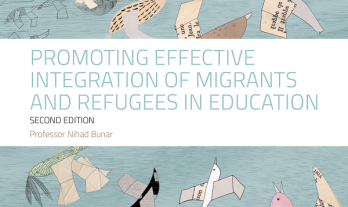4. Parental involvement
Introduction
Parents and families have the most direct and lasting impact on children’s learning and development. As the first educators of their children, they play a crucial role in their children's educational journey. A stimulating home environment that encourages learning as well as parental engagement in in-school activities are crucial for a child’s cognitive, social and emotional development. Playing with children or reading to them in their early years, helping with homework or discussing school life at home, taking part in parent-teacher meetings and other school activities will have positive and lasting effects on children's motivation to learn, their attention, behaviour and academic achievements. Parents' educational expectations for their children will also play a crucial role in shaping their children's learning. Building family-school partnerships and engaging parents as learning partners from the early years is therefore essential to improving children’s and young people’s development.
However, the relationship between schools, parents and families may be challenging. Many parents from disadvantaged backgrounds, while having high expectations and wanting the best for’ their children’s schooling, may not engage as they feel unfamiliar with the current school system and distant from the school culture and its 'language'. Some may be de-motivated by their own experience of failure at school, or may not feel able to support their children. Parents from migrant background may feel they lack the linguistic skills to communicate with schools, help their children and monitor their progress; they may be discouraged by a sense of distance between their values and culture and those of the host country, as represented by the school. Single parenting or jobs with long work days or that do not allow for flexible hours or may also hinder parental involvement.
On the other hand, teachers may perceive parents as passive, opportunistic or intrusive, or may lack time and experience to communicate, reach out to or engage with parents from diverse backgrounds. They may fear that involving parents will take their time and will be detrimental to their teaching duties. In some cases, communicating with and involving parents may not be sufficiently recognised as a key role for teachers and schools in encouraging educational success. Further, reasons behind distancing or inertia of some parents are not well understood by teachers and parents' roles in schools are not clear.
Effective family-school partnerships need to be based on mutual respect and acknowledgement of each party's values, assets and expertise. Parents and families from all backgrounds and educational levels need to feel welcome at school and be considered as resources. They need to be recognised and adequately supported as co-educators in their children’s learning, starting from an early age.
Research shows that a multidisciplinary approach, with involvement of parents, children, teachers and professionals is key to resolving behavioural problems of school children.
Find out more:
- Claveria, J. V., and Alonso, J. G., ‘Why Romà do not like mainstream schools: Voices of a people without territory’, Harvard Educational Review, Vol. 73, No. 4, 2003, pp. 559-590
- Downes, P., ‘Towards a Differentiated, Holistic and Systemic Approach to Parental Involvement in Europe for Early School Leaving Prevention’, Report prepared for the URBACT project PREVENT, 2014
- Sheridan, S., Hoo Ryoo, J., Garbacz A, Kunz G., Chumney, F., 2013, ‘The efficacy of conjoint behavioral consultation on parents and children in the home setting: Results of a randomized controlled trial’, Journal of School Psychology, Vol. 51, pp. 717-733.
Chapters
4.1. Communication and information
ExpandResearch has shown that the benefits of parental involvement depend largely on its quality. Schools have an important role to play in developing and maintaining communication and information flows with parents. Most European countries have legal provisions in place to ensure the right of parents to be informed about their children's schooling. However, this may not be very effective for parents and families that are most distant from the school culture. In addition to formal arrangements for communication, a set of complementary measures are needed, to reach different groups of parents, including those with different parenting styles and levels of 'distance' from the school.
Communication needs be mutual, balanced and ongoing. On the one hand, it is important to make sure that parents and families understand what it is expected from them and how they contribute to their children's learning. They should be convinced that establishing a dialogue between themselves and the school is essential to increasing the educational success of their children. Schools need also to listen to the views of all parents, including parents who are less engaged in their children’s schooling.
Communication and information must be clear, and take into account the different cultural and economic backgrounds of each family. Communication channels need to be diversified and cater to heterogeneous groups of parents: they should allow a mutual exchange of information and sharing of experiences. This might include more formal approaches, such as inviting parents to meet teachers, or more informal initiatives, such as welcome sessions at the beginning of the school year (during which the school leaders and the teachers welcome parents and children informally and explain school rules). Open days and optional or festive activities can also help reinforce communication and mutual understanding. Parents may also benefit from sessions that have been organised to help explain the curriculum, the values and mission of the school and career guidance.
ICT tools can support communication with parents (e.g. use of e-diaries, text messages, newsletters, interactive websites, etc.), provided a clear language is used and it is accompanied by other measures and training on how to use it for school purposes. Inviting parents to observe classrooms for a limited time can also be beneficial for parents (who may feel reassured to see what happens in class and be inspired as to how to support their children at home); teachers (who can use these opportunities to establish dialogue with parents); and, learners (who are often more active in class when parents are present).
Targeted efforts may be needed to reach out to more distant parents and families, e.g. through personalised invitations, no matter whether the child is performing well or not in school. For example, outreach activities, cultural mediators, mentors and support from local NGOs may help facilitate communication with migrant or marginalised parents. Parents can often serve as a valuable resource and can support each other.
In order to build effective and positive communication with parents and families, it is essential for school leaders and teachers to develop relational and communication skills. The teacher training curriculum should also raise awareness on the importance of parental involvement and the need to acquire relational and communication expertise.
Information from surveys and data on school climate and relationships between learners, school, parents and teachers should be used to improve practices and increase quality in schools.
Find out more:
- Borgovoni, F. , Montt, G., Parental Involvement in Selected PISA Countries and Economies, OECD Working Paper Number 73, OECD, Paris, 2012
- OECD, Equity and Quality in Education: Supporting Disadvantaged Students and Schools, OECD, Paris, 2012
4.2. Parents' involvement in school governance
ExpandEnhancing family-school partnerships and increasing parent participation in educational decision-making can be highly effective for combatting early school leaving. Wide parental participation in decisions related to learning, as well as to the organisation of the school and its activities, promotes transparency and better adjustment to actual family needs of and creates a greater sense of shared responsibility around education. In most European countries, the role of parents within schools is recognised by law and their rights are guaranteed by regulatory provisions detailing the nature of these rights. There are procedures to ensure the rights of parents to participate in some forms of school decision-making processes, e.g. through representation of parents in school boards and councils. Parents are therefore encouraged to participate, via their elected representatives, in the different school bodies, notably school councils and class councils.
However, in practice, different starting points and levels of parental involvement and influence in these processes related to cultural and institutional factors can be observed. Whilst formal approaches such as parents’ associations, parent councils and parent consultations can be effective ways to involve parents, less formal approaches are also required to ensure all parents are taken into account. It is particularly important to ensure parents and families from more vulnerable socio-economic backgrounds are adequately represented in school decision-making. Less formal gatherings may be useful in reaching out and engaging some more distant parents in school life.
School leaders play an important role in fostering parental involvement, for example through participatory planning and evaluation processes.
4.3. Spaces for parents and involvement in educational activities
ExpandAn effective way to create a positive family-school partnership and engage parents is to provide welcoming and safe opportunities for parents to be present at the school, share their expertise, build their confidence and their leadership capacities, social networks and learning. Parents and families may have designated time and spaces at the school. This could include, for example, a ‘parents’ room’ where informal activities may be organised at their request and/or with the help of other professionals (e.g. social workers) or school staff. The room could be used during school hours to organise talks on school and parenting issues, meetings with external specialists and professionals, workshops and other informal activities.
Schools could also organise ‘parent days’, inviting parents to visit the school, and learn more about the curriculum, activities and its values and mission.
Parents also serve as valuable resources to schools and could be invited to share their skills and expertise. Family members could be invited to volunteer in educational activities within the classroom (e.g. reading to the class, teacher’s support), or in other in-school activities (both curricular and extra-curricular, such as homework clubs and after-school programmes). Participation of parents in educational activities, including parents from different cultures or with different educational experiences, makes it possible to increase the number and diversity of interactions, which in turn accelerates the learning process; they can help learners overcome cultural stereotypes and generate more motivation. Parents and family members could also be involved in activities linked to career education and guidance, for example by talking about their profession and work experience.
Where necessary, other service providers, NGOs and professionals, such as cultural mediators, may help build positive relationships with parents, especially those who are from marginalised groups.
Opening up school facilities outside school hours for programmes and classes for parents (e.g. language classes for parents with migrant background and who do not speak the language of their children’s instruction adequately) can help increase parental involvement and break down barriers between schools and families. However, for parents with very negative past experiences of school, opportunities for lifelong learning in different locations, such as community-based centres, could be created in partnership with NGOs. Such community-based centres may also serve as 'one stop shops' for family support, with multi-disciplinary teams providing a wide range of services, including health and emotional support.
Find out more:
- Strategies for inclusion and social cohesion in Europe from education, by the EU project INCLUD-ED
- Downes, P.,Community-Based Lifelong Learning Centres: Developing a European strategy Informed by International Evidence and Research, NESET Research paper, 2011.
4.4. Family learning
Expand‘Family learning’ refers to any activity that involves both children and adult family members (with all working toward their own learning outcomes) and that contributes to a culture of learning in the family. Raising the educational level of parents is one successful approach to preventing early school leaving. When parents engage in educational activities for themselves, a series of cultural and educational interactions are promoted within the family.
Through family learning, parents build their self-efficacy, are empowered to become active agents at the school, and are more involved in their children’s schooling. Parents may also build their confidence to help their children in learning at home. At the same time, children have more opportunities to learn with their parents, which leads to increased engagement in school and better educational outcomes.
Research shows that involving families in literacy programmes is essential for increasing the literacy and numeracy levels of children and adults. Key findings from a European research project show that family literacy programmes are highly cost-effective, both in improving child literacy and in improving parental support skills. It is important that they are in line with and complement classroom literacy activities.
There should also be a range of complementary programmes targeting the needs of specific groups, including low-income families and ethnically diverse groups. These programmes should seek to improve child literacy and socio-emotional development, while also developing the parents' capacity to support their child's learning. Enhancing general parenting skills is also an essential part of family learning. Such programmes should therefore be provided as early as possible in a child's development. Funding, quality of the programme and partnerships between key individuals are considered key to the long-term success of family learning programmes.
Find out more:
- Carpentieri, J., Fairfax-Cholmeley, K., Litster, J., Vorhaus, J., Family literacy in Europe: Using parental support initiatives to enhance early literacy development, NRDC, Institute of Education, London, 2011
- EU High-Level Group of Experts on Literacy, Final Report, Brussels, 2012.
- EUCIS-LLL, Policy debate on Intergenerational learning for inclusive societies, March 2015
- NIACE, Family Learning Works: The Inquiry into Family Learning in England and Wales, 2013








